Solanum colombianum
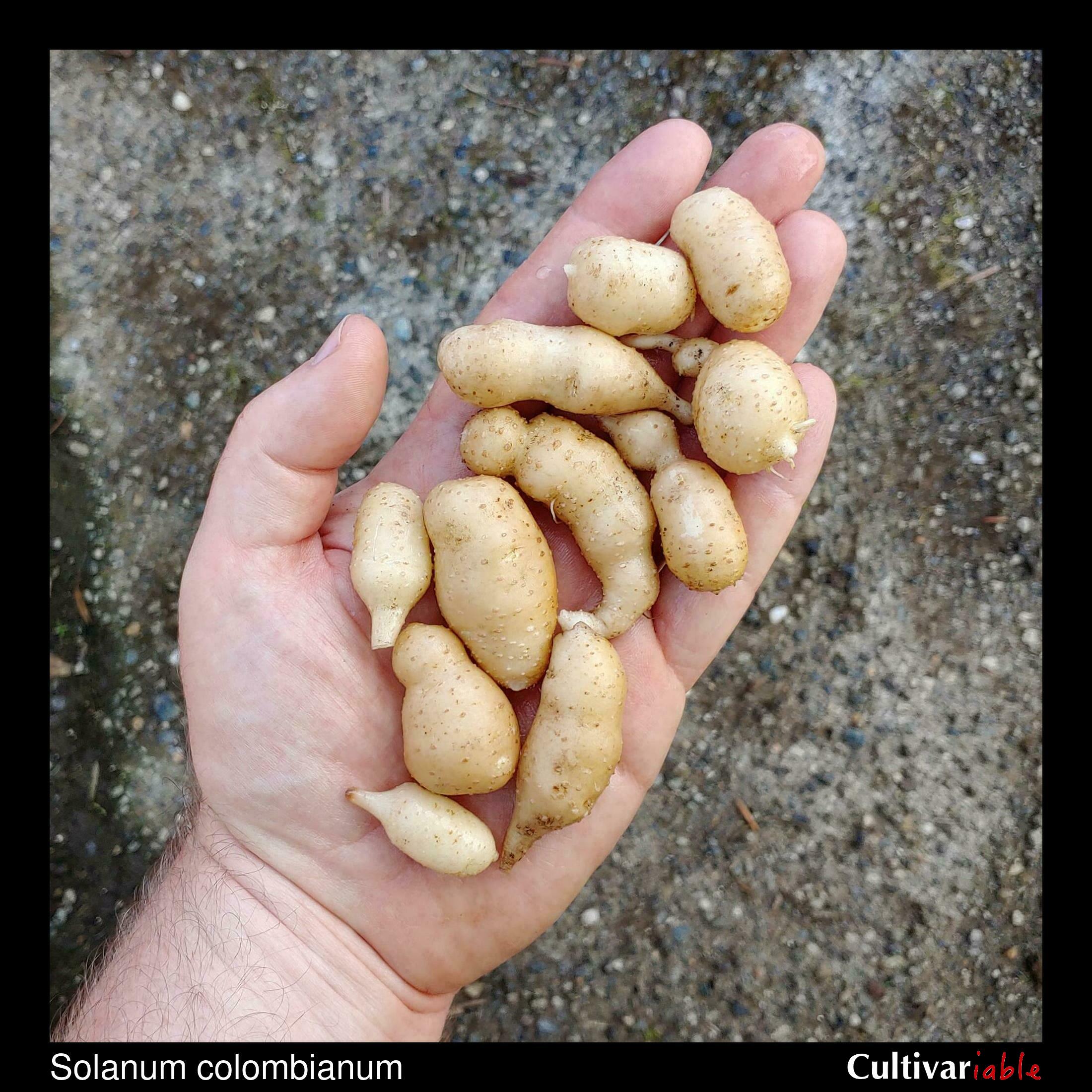
| Common Names | Papa de duende, papa de indio, papa de vieja |
| Code | col |
| Synonyms | S. cacetanum, S. calacalinum, S. cuatrecasasii, S. filamentum, S. jaenense, S. moscopanum, S. nemorosum, S. orocense, S. otites, S. pamplonense, S. paramoense, S. subpanduratum, S. sucubunense, S. tundalomense |
| Clade | 3+4 |
| Series | Conicibaccata |
| Ploidy | Diploid (2x), Tetraploid (4x), Hexaploid (6x) |
| EBN | 2 |
| Tuberization Photoperiod | Unknown |
| Self-compatibility | Yes |
| Nuclear Genome | AP |
| Cytoplasmic Genome | M |
| Citation | Dunal: A. L. P. P. de Candolle, Prodr. 13(1):33. 1852 |
Description
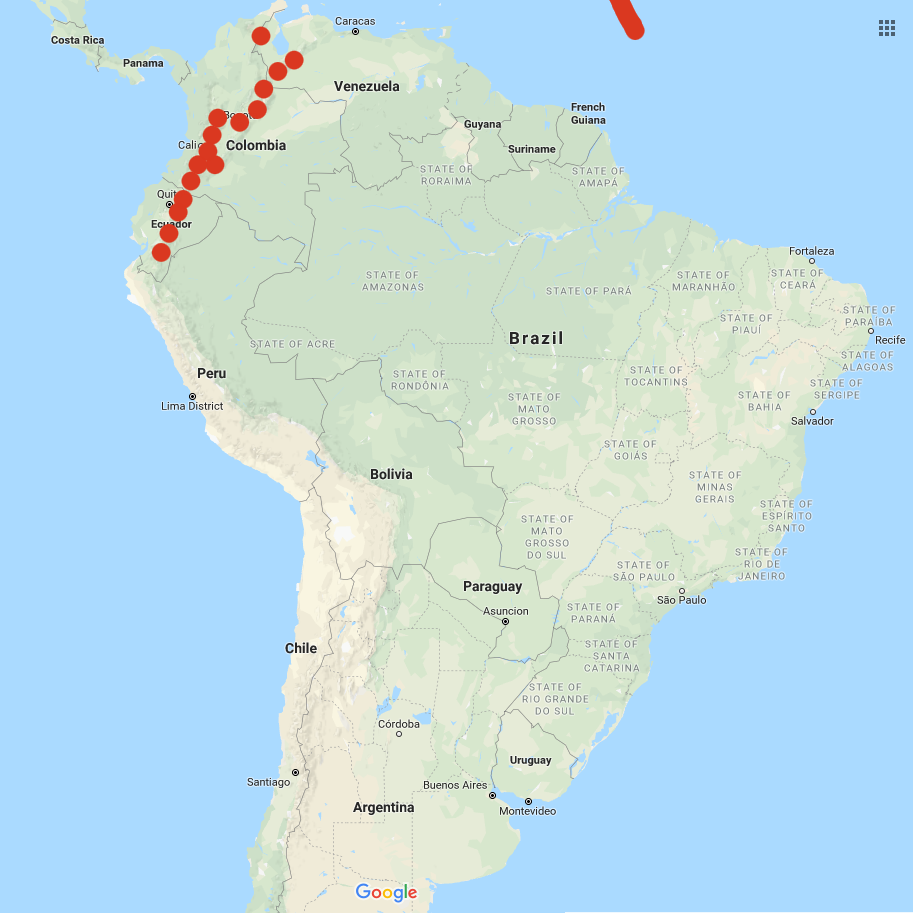
Solanum colombianum is a woodland species ranging from southern Ecuador through Colombia and into Venezuela. Plants up to two feet tall. Stolons to about 16 inches. Tubers whitish, ovoid, to about an inch. Flowers white to light blue. Berries conical. Grows from roughly 7,200 to 12,500 feet (2200 to 3800 m) (Correll 1962).
The specific epithet, colombianum, refers to Colombia. While there is no completely standardized pronunciation for scientific names, the most common way to pronounce this species is probably so-LAY-num ko-LOM-bee-AH-num.
S. colombianum and S. flahaultii are closely related and may either be part of the same species or may interbreed where their ranges overlap.
Resistances
Vega (1995) found that this species is less frost tolerant than domesticated potato. I have observed a surprisingly high degree of frost resistance in some accessions. This species has no reported resistance to early blight or late blight, but it has repeatedly remained healthy well into the autumn here, when domesticated species and other wild potatoes routinely succumb to both.
| Condition | Type | Level of Resistance | Source |
|---|---|---|---|
| Alternaria solani (Early Blight) | Fungus | Not resistant | Jansky 2008 |
| Frost | Abiotic | Somewhat resistant | Machida-Hirano 2015 (as S. moscopanum) |
| Globodera pallida (Pale Cyst Nematode) | Invertebrate | Not resistant | Bachmann-Pfabe 2019 |
| Pectobacterium carotovorum (Blackleg/Soft Rot) | Bacteria | Somewhat resistant | Chung 2011 |
| Phytophthora infestans (Late Blight) | Fungus | Not resistant | Gonzales 2002 |
| Phytophthora infestans (Late Blight) | Fungus | Not resistant | Bachmann-Pfabe 2019 |
| Phytophthora infestans (Late Blight) | Fungus | Somewhat resistant | Machida-Hirano 2015 |
| Potato Virus Y (PVY) | Virus | Not resistant | Cai 2011 |
Glykoalkaloid content
I have found no accounts of glycoalkaloid content for this species. Tubers vary from moderate bitterness to apparent palatability and I suspect that it would be possible to make edible selections of this species.
Images
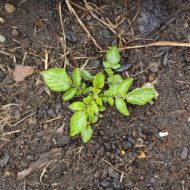 |
 |
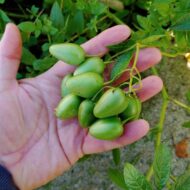 |
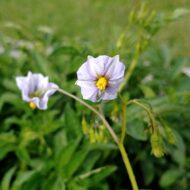 |
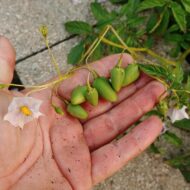 |
|||
Cultivation
I have have found this species difficult to germinate and have been unsuccessful in getting the small number of seedlings produced to maturity.
Towill (1983) found that seeds of this species stored at 1 to 3 degrees C germinated at 62% after 20 years.
Breeding
Watanabe (1991) found that 4.2% of varieties of this species produced 2n pollen.
Crosses with S. tuberosum
| Female | Male | Berry Set |
Seed Set | Germ | Ploidy | Source |
|---|---|---|---|---|---|---|
| S. colombianum 4x | S. tuberosum 4x | None | None | Jackson (1999) | ||
| S. colombianum 4x (as S. tundalomense) | S. tuberosum 4x | Low | Moderate | Jackson (1999) | ||
| S. colombianum 6x (as S. moscopanum) | S. tuberosum 4x | Moderate | Moderate | Jackson (1999) | ||
| S. tuberosum 4x | S. colombianum 4x (as S. tundalomense) | Minimal | None | Jackson (1999) | ||
| S. tuberosum 4x | S. colombianum 6x (as S. moscopanum) | None | None | Jackson (1999) |
Crosses with other species
| Female | Male | Berry Set |
Seed Set | Germ | Ploidy | Source |
|---|---|---|---|---|---|---|
| S. chomatophilum | S. colombianum (as S. jaenense) | Yes | Very low | Ochoa 2004 | ||
| S. colombianum (as S. jaenense) | S. chomatophilum | Yes | No | Ochoa 2004 |
References
Solanum colombianum at Solanaceae Source
